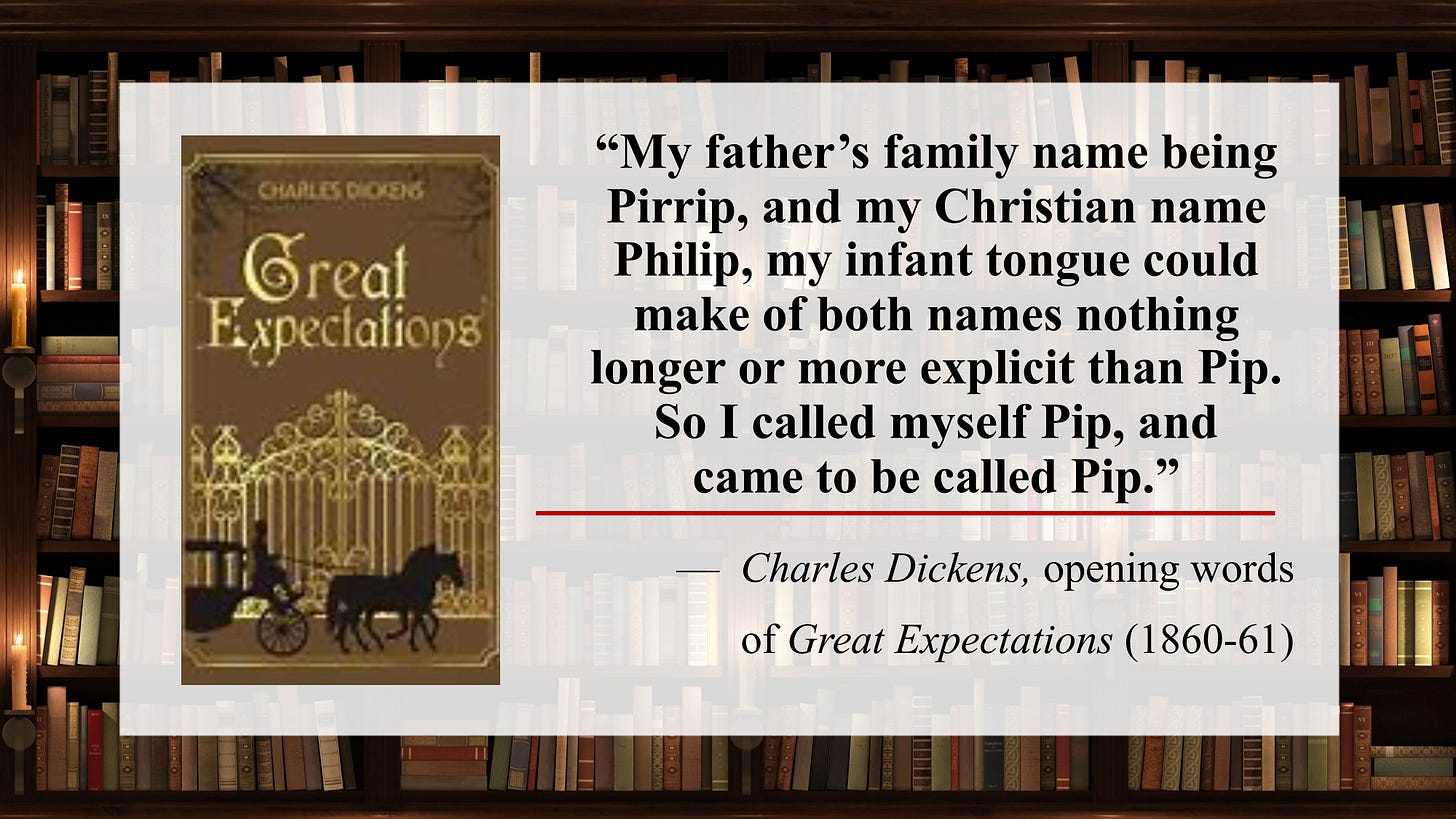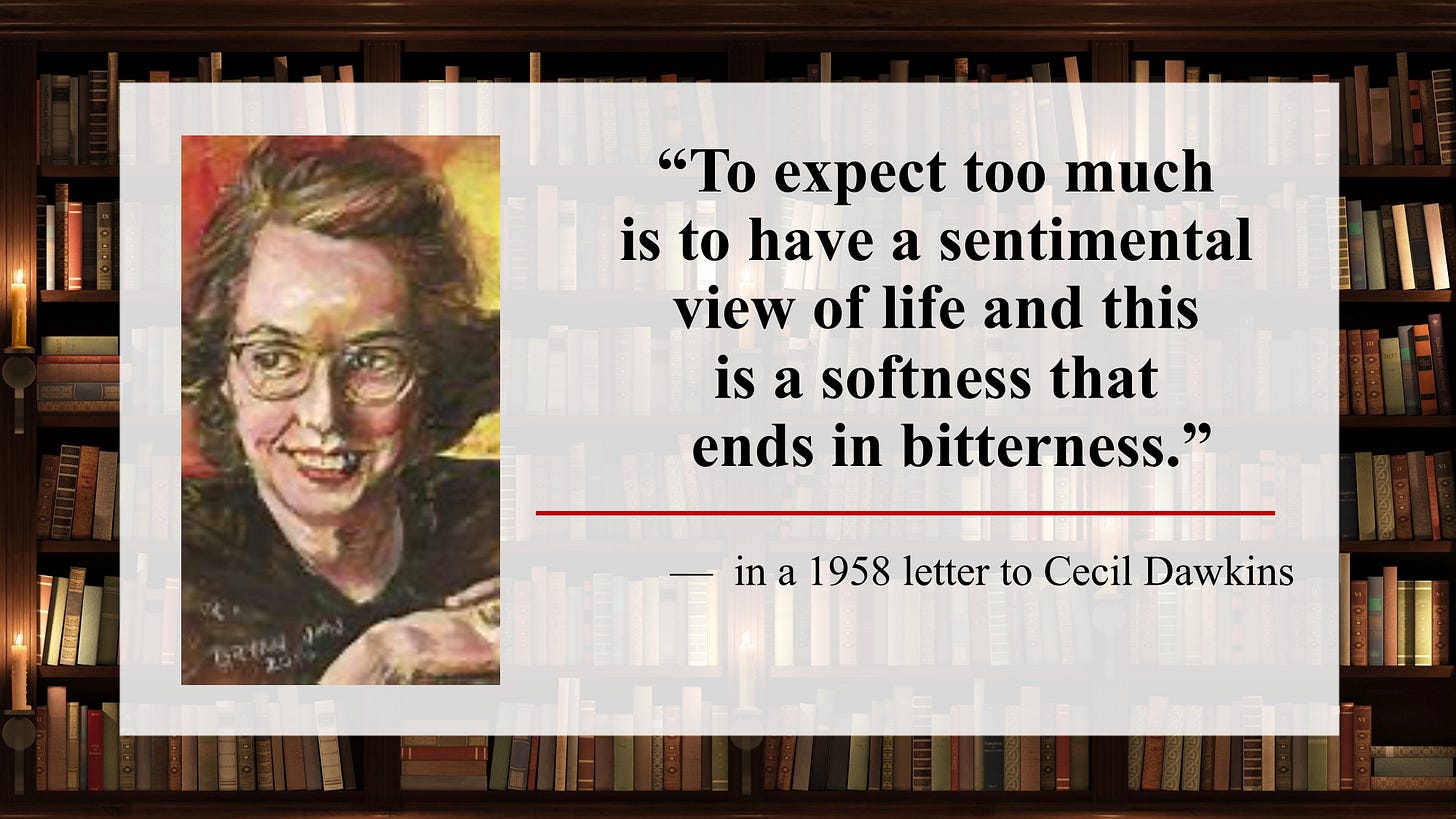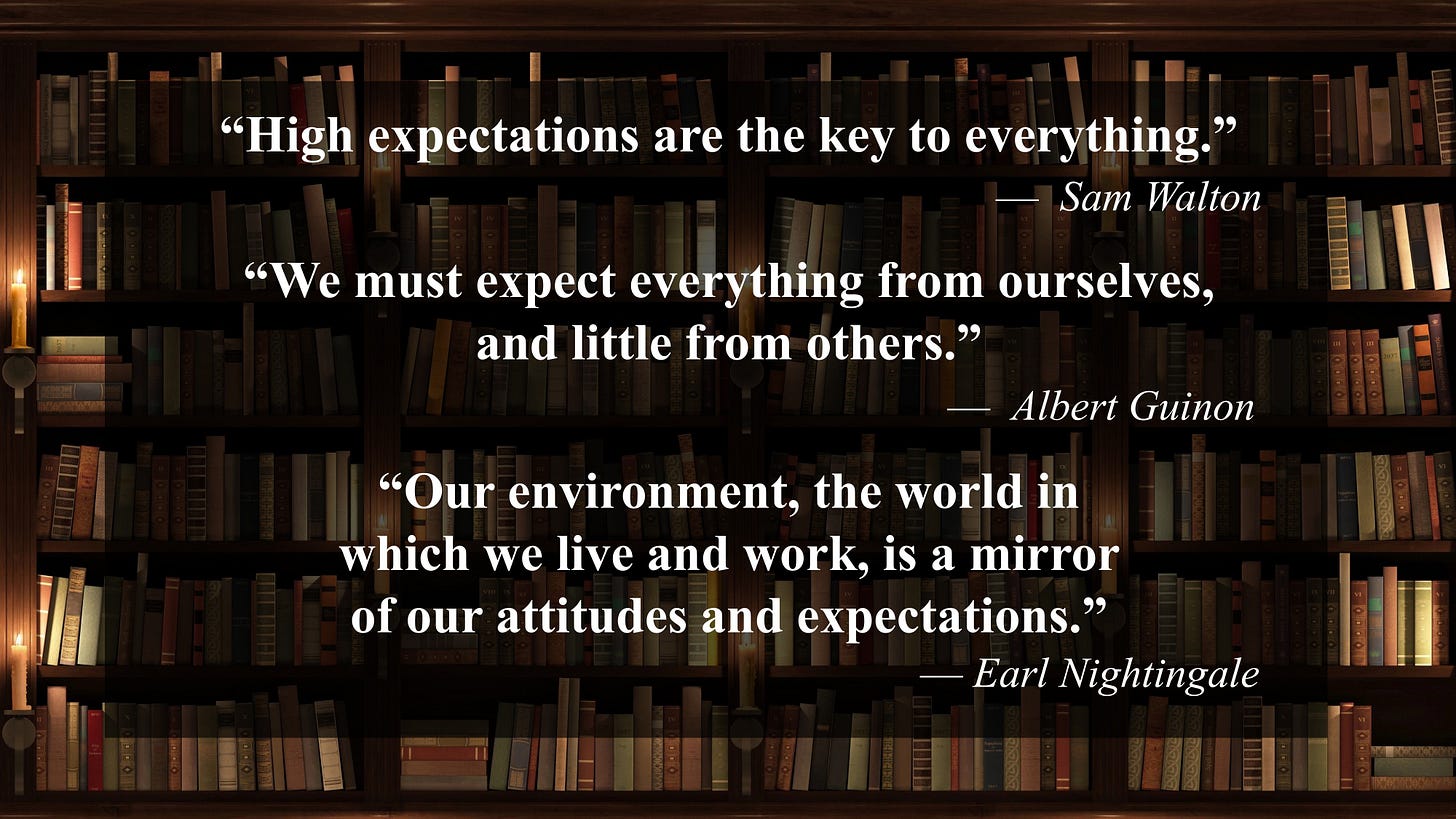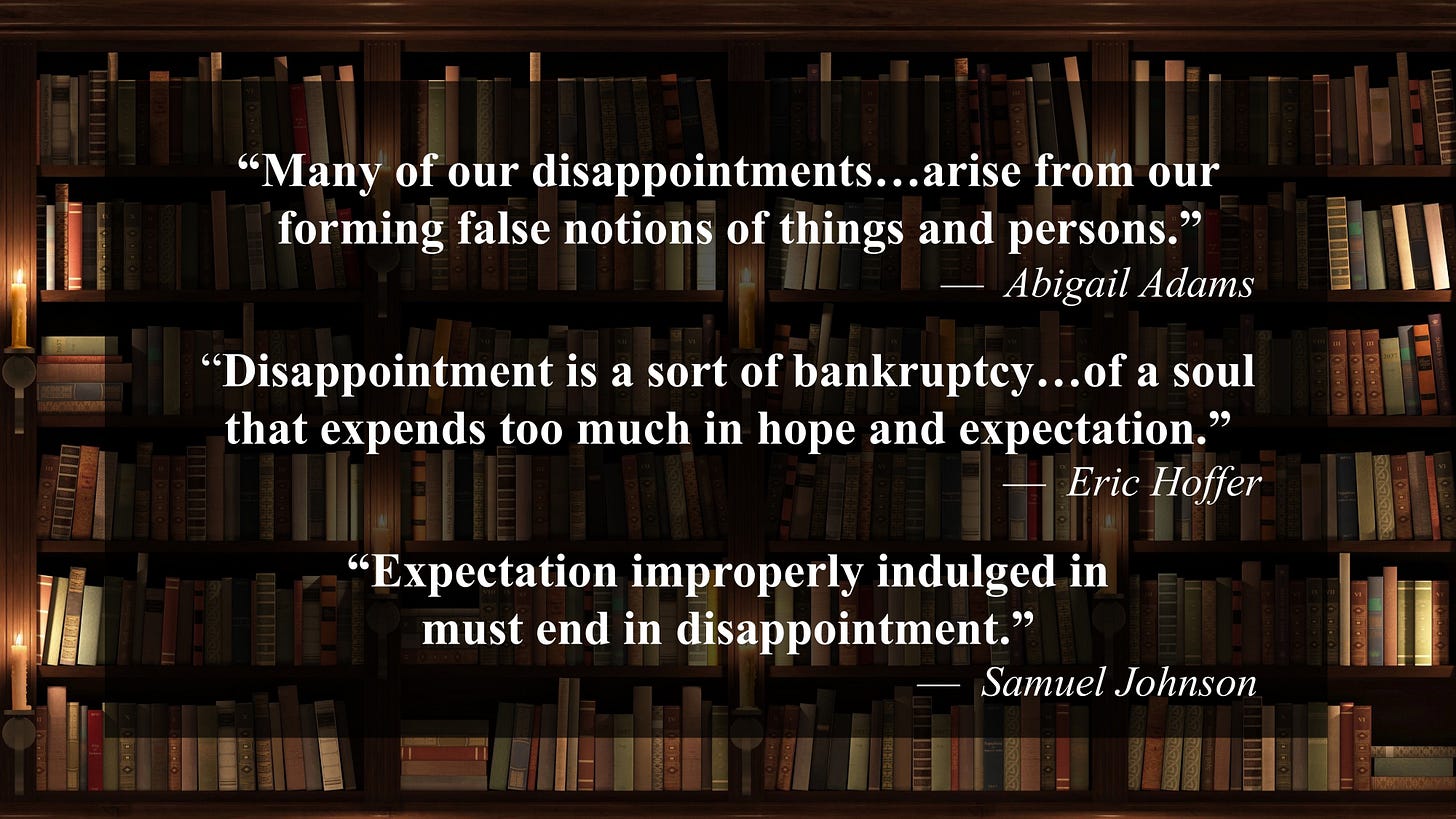Dr. Mardy's Quotes of the Week ("Unrealistic Expectations")
March 16-22, 2025 | THIS WEEK'S THEME: “Unrealistic Expectations"
Great Opening Line of the Week
The opening words of this literary classic introduce us to Philip Pirrup—“Pip” for short—the narrator and protagonist. Beginning his life as a poor orphan with no prospects, Pip unexpectedly receives financial support from a secret benefactor. The result? He begins to entertain great expectations about becoming a gentleman, winning the heart of the beautiful Estella, and achieving sublime happiness.
As the novel unfolds, however, Pip’s expectations do not come to pass, and instead of happiness and contentment, he is filled with sorrow and disillusionment. While he ultimately achieves peace of mind, it only comes after he realizes his original expectations were deeply flawed.
For more than 2,000 memorable opening lines from every genre of world literature, go to www.GreatOpeningLines.com.
This Week’s Puzzler
On March 25, 1925, this woman was born in Savannah, Georgia. The only child of a real estate agent and his homemaker wife, she was raised in a devout Catholic home. She was only eleven when her father was diagnosed with lupus, and four years later was devastated by his death. She and her mother moved to a farm near Milledgeville, Georgia, where she finished high school and attended Georgia State College for Women (now Georgia College and State University), graduating in 1945. While an undergraduate, she was editor of the school’s literary magazine.
In 1945, she received a scholarship to study journalism at the State University of Iowa (now the University of Iowa), but soon developed doubts about a career in journalism. She was advised to speak with Paul Engle, head of the university’s Program in Creative Writing (later to become the “Iowa Writers’ Workshop”). After overcoming strong initial reservations because of her extreme shyness and thick southern drawl, he accepted her into the program and ultimately became her greatest supporter. She received an M.F.A. degree in 1947.
In 1950, shortly after coming out with her first novel, Wise Blood (1950), she felt a numbness in her arms that was later diagnosed as the same form of lupus that had killed her father. Expecting to die in about five years, she moved back to Georgia to live with her mother at Andalusia Farm, the family’s ancestral estate near Milledgeville, Georgia (now listed on the National Register of Historic Places).
Between her initial diagnosis and her death from lupus at age 39 in 1964, she became one of America’s most respected short story writers. A representative of the so-called “Southern Gothic” tradition, her tales were collected in A Good Man is Hard to Find (1955) and Everything That Rises Must Converge (1965). In 1971, The Complete Stories of _______ ______ won the National Book Award for Fiction, selected over John Updike’s Rabbit Redux and novels by E. L. Doctorow, Joyce Carol Oates, Cynthia Ozick, and Walker Percy.
In a 1958 letter to a friend, she wrote:
Who is this person? (Answer below)
What Role Have Expectations Played in Your Life?
As I approach this week’s theme, I’ll be specifically focusing on expectations people have about themselves and their lives. In a future post, I’ll turn my attention to the equally interesting topic of expectations other people have about us.
The subject of expectations has been explored by almost all of history’s great thinkers and writers, resulting in many truly memorable quotations.
The American Etymological Dictionary defines expectations as “preconceived opinions as to what will likely take place” in life. The word derives from the Latin verb expectare, meaning “to look out for something” or “to anticipate a future outcome.” Around the 17th century, the word took on the meaning of what life will be like when something we’ve expected comes to fruition.
Expectations play a huge role in guiding our choices and shaping our behavior. For example, to be a success in life, you must work hard and strive for excellence is a common expectation, and one that can serve people quite well. However, when it suddenly and unexpectedly clashes with a harsh reality—as when a promotion you’ve long sought is given to your boss’s nephew—it can be disappointing and disorienting.
Human beings are the only animals that can envision a future, and this ability—combined with the remarkable power of imagination—is responsible for hope, optimism, and most of the great advances in civilization. Without expectations, life would be directionless, and devoid of planning, preparation, and everything else that gets us closer to where we want to go with our lives. Expectations are an inescapable—and essential—part of the human experience.
Expectations Often Make Us Better People
Many expectations are excellent guides for living, and, when explicitly articulated, almost read like a collection of timeless proverbs: If I work hard, I’ll be successful. If I seek happiness and cultivate a positive outlook, I’ll be a better person. If I strive for excellence in everything I do, I’ll be a more satisfied person. Expectations like these not only form the basis for human aspiration, they foster the development of character.
Having Expectations Puts Happiness at Risk.
In the 1980s, the Twelve-Step Recovery Movement in America gave us the saying, “Expectations are disappointments under construction.” The core idea behind the saying is that expectations create a mental image of how things in life should unfold—and when reality fails to live up to expectations, disappointment is inevitable.
Psychologists refer to this as the expectation-reality gap, a phenomenon that has always been present in human life, but is especially problematical in modern times, when social media makes it so easy to compare our imperfect lives to the carefully curated highlight reels of our friends and neighbors.
Lowering Our Expectations Can Be a Key to Happiness
The quotation in this week’s Puzzler warned of the dangers inherent in “expecting too much” out of life. That sentiment makes it part of a longstanding intellectual tradition that might be called a “Diminished Expectations Strategy” for finding happiness in life. The core idea is to lower one’s expectations. This point of view has long been championed by practitioners of the ancient philosophical approach known as stoicism, and it has been echoed by many others over the years.
Upon closer inspection, the essential idea behind this approach appears to be less about lowering expectations than it is about accepting life as it is rather than trying to shape it according to our beliefs or preconceived ideas. Happiness, from this point of view, is not derived from the fulfillment of expectations, but from the ability to navigate life’s unpredictability with grace and dignity.
Expectations Evolve Over Time
As we age and accumulate life experience, our expectations change, often for the better. For example, the person above who lost a job to the boss’s nephew might revise his expectation this way: to be a success in life, you must work hard and strive for excellence, even in a world that can be capricious and unfair.
In many respects, one might even regard wisdom as the gradual revision of our expectations to align with reality. As we mature, we learn to adjust our outlook—not by abandoning core principles, but by tempering or refining them with a deeper understanding of life’s complexities.
When expectations evolve, however, they don’t always evolve in a good way—and this takes us squarely into the world of unrealistic expectations.
Unrealistic Expectations and Beyond
The Oxford English Dictionary (OED) reminds us that fancy often produces “an idea or belief not necessarily based on reason or reality”—and Lady Morgan’s inspired observation perfectly captures the idea that expectations can be easily shaped by subjective desires, wishful thinking, mental health struggles, and even an irrational or ideological view of the world.
This idea is central to how unrealistic expectations change over time, making it possible for a “good friend supports you” expectation to devolve into something not merely unrealistic, but downright toxic: a good friend supports you whether you’ve done something good or bad.
This kind of thing is more common than you would think, and let me bring my remarks to a close this week with two examples of how expectations can steadily deteriorate over time, starting out as healthy and ultimately ending up not merely as unrealistic, but far worse. I’ll provide two examples, the first from the romantic arena, and the second from the world of politics.
THE LOVE ARENA
Healthy: I expect my partner to love and respect me, and I will do everything I can to reciprocate.
Questionable: If my partner truly loves me, our relationship should always feel natural and easy.
Unrealistic: It’s my partner’s job to make me feel loved, respected, and happy.
Toxic: As proof of true love, my partner should put me above all else, including his or her own needs, interests, or friendships.
Dangerous: If my partner doesn’t make me feel loved and respected, there must be consequences.
THE POLITICAL ARENA
Healthy: I expect that people will have different political views, and we can still discuss them with mutual respect.
Questionable: If people hear my well-reasoned and well-articulated arguments, they should at least partially agree with me.
Unrealistic: If someone disagrees with me, they must be uninformed, unintelligent, or stupid.
Toxic: Anyone who doesn’t support my views is not just wrong—they’re against me and what’s right.
Dangerous: If there is opposition to me and my ideas, it must be crushed.
This week, think about the role that expectations—realistic or otherwise—have played out in your life. Before you do, though, take a few moments to peruse this week’s selection of quotations on this important theme in human life:
A life that is burdened with expectations is a heavy life. Its fruit is sorrow and disappointment. — Douglas Adams
There is one illusion that has much to do with most of our happiness, and still more to do with most of our unhappiness. It may be told in a word. We expect too much. — Joseph Farrell
My happiness goes in direct proportion to my acceptance and in inverse proportion to my expectations. — Michael J. Fox
There is hardly any activity, any enterprise, which is started out with such tremendous hopes and expectations, and yet which fails so regularly, as love. — Erich Fromm
So often, happiness is the extent to which we balance our grandiose expectations with reality. — Cathy Guisewite
My expectations were reduced to zero when I was 21. Everything since then has been a bonus. — Stephen Hawking
It’s hard to close the door on optimistic expectations when you love someone. — Dennis Lehane
What makes earth feel like Hell is our expectation that it should feel like Heaven. — Chuck Palahniuk
All relationships have the same basic components: people, needs, and expectations. — Iyanla Vanzant
The best use of history is as an inoculation against radical expectations, and hence against embittering disappointments. — George Will
For source information on these quotations, and more observations on the theme of EXPECTATIONS, go here.
Cartoons of the Week:
Answer to This Week’s Puzzler:
Flannery O’Connor (1925-64)
Dr. Mardy’s Observation of the Week:
Thanks for joining me this week. See you next Sunday, when the theme will be “Suffering.”
Mardy Grothe
Websites: www.drmardy.com and www.GreatOpeningLines.com
Regarding My Lifelong Love of Quotations: A Personal Note













as an animal lover, today's writing mentioned humans are the only animals that can envision a future - yes, then you added, combined w/ imagination, which might be more difficult to study w/ other animals.
however, extensive scientific research has proved that corvids, the group of birds that include crows, ravens, and jays, can think ahead and plan for the future. They have thinking capabilities that rival those of 7–10 year old humans. Instinct plays a role in many animal "future" planning, however following these studies sheds more fascinating 'fun', imo, findings on those little brains.
& hope you don't mind a link to cuttlefish pass the marshmellow test given to kids
https://www.sciencealert.com/cuttlefish-can-pass-a-cognitive-test-designed-for-children
Mardy, your comments on expectation are enlightening, especially how they can lead to disappointment. A close relatives of expectation is anticipation. Rather than expect something and do nothing, if we plan and take action we are better able to anticipate results. Anticipation can also be an act of love when we foresee what someone will need or desire and act on their behalf. Thanks for your always mind-opening comments and quotations. I always anticipate the best from you and your column.